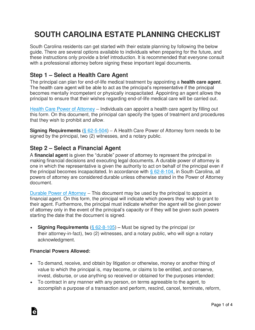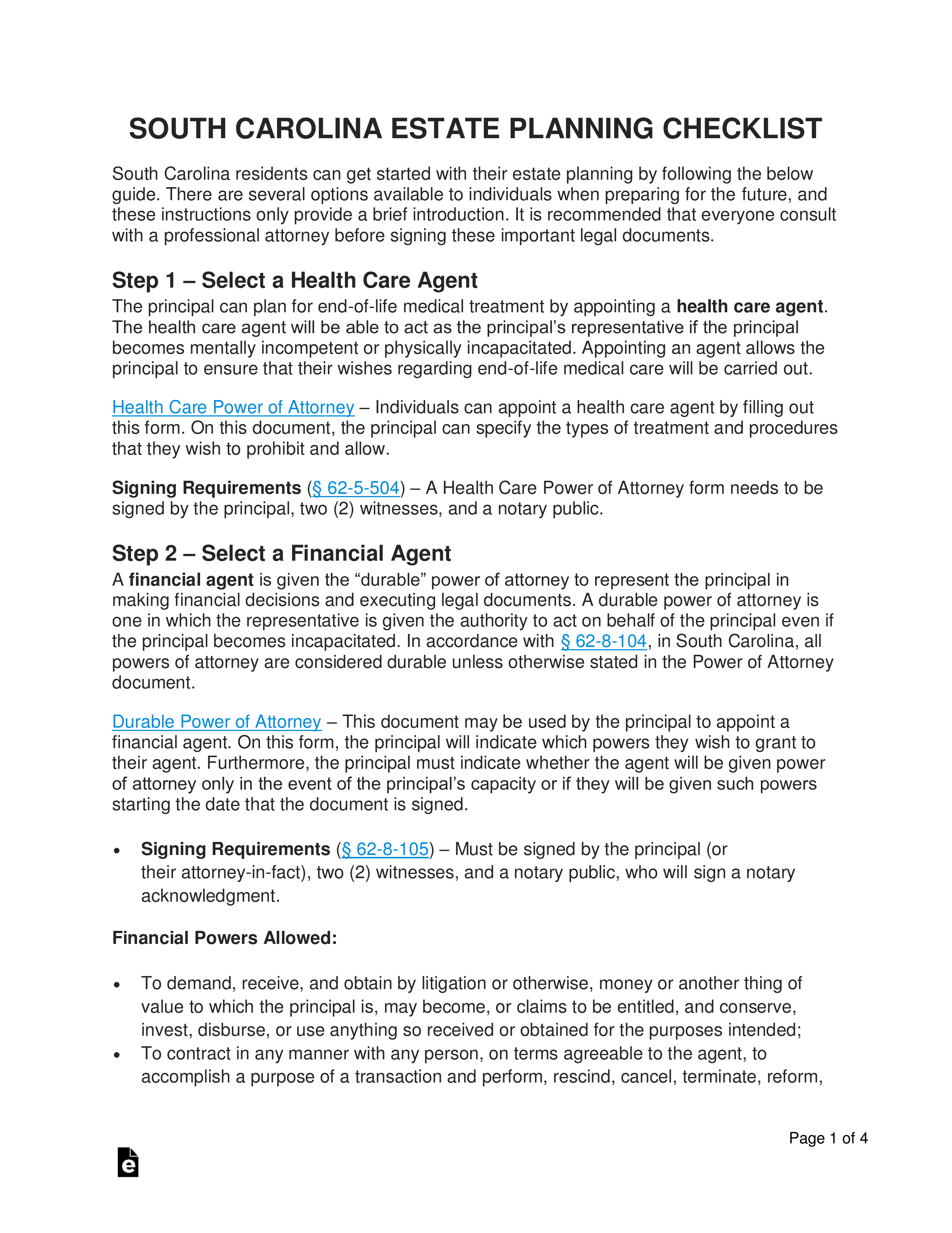Updated March 05, 2024
A South Carolina estate planning checklist is a guide for individuals who wish to plan for end-of-life medical treatment and the distribution of their estate when they die. For an individual to prepare for their mental or physical incapacity, they can use the Health Care Power of Attorney and Durable Power of Attorney forms. To plan the administration of their estate, the Last Will and Testament or the Revocable Living Trust documents may be employed.
How to Create an Estate Plan in South Carolina (6 steps)
- Select a Health Care Agent
- Select a Financial Agent
- Make a List of All Estate Items
- Beneficiaries
- Execute Estate Transfer Documents
- Attend Hearing
South Carolina residents can get started with their estate planning by following the below guide. There are several options available to individuals when preparing for the future, and these instructions only provide a brief introduction. It is recommended that everyone consult with a professional attorney before signing these important legal documents.
1. Select a Health Care Agent
The principal can plan for end-of-life medical treatment by appointing a health care agent. The health care agent will be able to act as the principal’s representative if the principal becomes mentally incompetent or physically incapacitated. Appointing an agent allows the principal to ensure that their wishes regarding end-of-life medical care will be carried out.
Health Care Power of Attorney – Individuals can appoint a health care agent by filling out this form. On this document, the principal can specify the types of treatment and procedures that they wish to prohibit and allow.
Signing Requirements – A Health Care Power of Attorney form needs to be signed by the principal, two (2) witnesses, and a notary public.[1]
2. Select a Financial Agent
A financial agent is given the “durable” power of attorney to represent the principal in making financial decisions and executing legal documents. A durable power of attorney is one in which the representative is given the authority to act on behalf of the principal even if the principal becomes incapacitated. In accordance with § 62-8-104, in South Carolina, all powers of attorney are considered durable unless otherwise stated in the Power of Attorney document.
Durable Power of Attorney – This document may be used by the principal to appoint a financial agent. On this form, the principal will indicate which powers they wish to grant to their agent. Furthermore, the principal must indicate whether the agent will be given power of attorney only in the event of the principal’s capacity or if they will be given such powers starting the date that the document is signed.
- Signing Requirements – Must be signed by the principal (or their attorney-in-fact), two (2) witnesses, and a notary public, who will sign a notary acknowledgment.[2]
Financial Powers Allowed:
- To demand, receive, and obtain by litigation or otherwise, money or another thing of value to which the principal is, may become, or claims to be entitled, and conserve, invest, disburse, or use anything so received or obtained for the purposes intended;
- To contract in any manner with any person, on terms agreeable to the agent, to accomplish a purpose of a transaction and perform, rescind, cancel, terminate, reform, restate, release, or modify the contract or another contract made by or on behalf of the principal;
- To execute, acknowledge, seal, deliver, file, or record an instrument or communication the agent considers desirable to accomplish a purpose of a transaction, including creating at any time a schedule listing some or all of the principal’s property and attaching it to the power of attorney;
- To initiate, participate in, submit to alternative dispute resolution, settle, oppose, or propose or accept a compromise with respect to a claim existing in favor of or against the principal or intervene in litigation relating to the claim;
- To seek on the principal’s behalf the assistance of a court or other governmental agency to carry out an act authorized in the power of attorney;
- To engage, compensate, and discharge an attorney, accountant, discretionary investment manager, expert witness, or other advisor, even though they are associated with the agent to advise or assist the agent in the performance of the agent’s administrative duties and to act upon their recommendation without independent investigation and, instead of acting personally, to employ one or more agents to perform an act of administration, whether or not discretionary;
- To prepare, execute, and file a record, report, or other document to safeguard or promote the principal’s interest under a statute or regulation;
- To communicate with a representative or employee of a government or governmental subdivision, agency, or instrumentality, on behalf of the principal;
- To access communications intended for, and communicate on behalf of the principal, whether by mail, electronic transmission, telephone, or other means, access the principal’s files electronically, and obtain the principal’s usernames and passwords;
- To do any lawful act with respect to the subject and all property related to the subject.
3. Make a List of All Estate Items
During the estate planning process, the principal will need to take stock of all their property, possessions, and financial accounts. By drafting an organized list of all their belongings, real estate, bank accounts, and investments, the principal will more easily decide to whom each asset will be transferred. Furthermore, a list of assets and property lessens the chance of the estate owner leaving items out of the estate distribution document.
Current Assets List – This form can be used to make a complete list of an individual’s current assets for the purpose of planning the administration of their estate.
4. Beneficiaries
5. Execute Estate Transfer Documents
Once the principal has organized their lists of assets and beneficiaries, they will need to choose the method that they will use to administer their estate. There are two (2) options that most people will choose from for this purpose, both of which are described below.
Last Will and Testament – A Last Will and Testament is the most widely known and used instrument for administering an individual’s estate. Using this document, the principal (called the “testator”) can leave thorough instructions on how their estate should be divided amongst their beneficiaries after the principal’s death. Unlike a Living Trust (see below), a Will must pass through a probate court before the principal’s property can be distributed. The probate process is often a long and laborious procedure.
- Signing Requirements – The signing requirements for a Will demand that the testator must sign with two (2) witnesses, who are also required to sign.[3]
Revocable Living Trust – Whereas a Will only comes into effect when the principal dies, a Living Trust is effective from the moment that it is executed. To make a Living Trust, the principal (called the “settlor”) must transfer the ownership of their assets into the Trust. By appointing themselves as a trustee, the settlor will continue to have access to their assets while alive. When the principal dies, their property will be distributed according to their wishes without needing to pass through probate court.
- Signing Requirements – State law only requires the person creating the Trust to sign the Trust document.[4]
6. Keep the Documents Safe
South Carolina Estate Planning Laws
- Health Care Power of Attorney – Title 62, Article 5, Part 5 – Health Care Powers of Attorney
- Durable Power of Attorney – Title 62, Article 8 – South Carolina Uniform Power of Attorney Act
- Last Will and Testament – Title 62 – South Carolina Probate Code
- Living Trust (Revocable) – Title 62, Article 7 – South Carolina Trust Code


